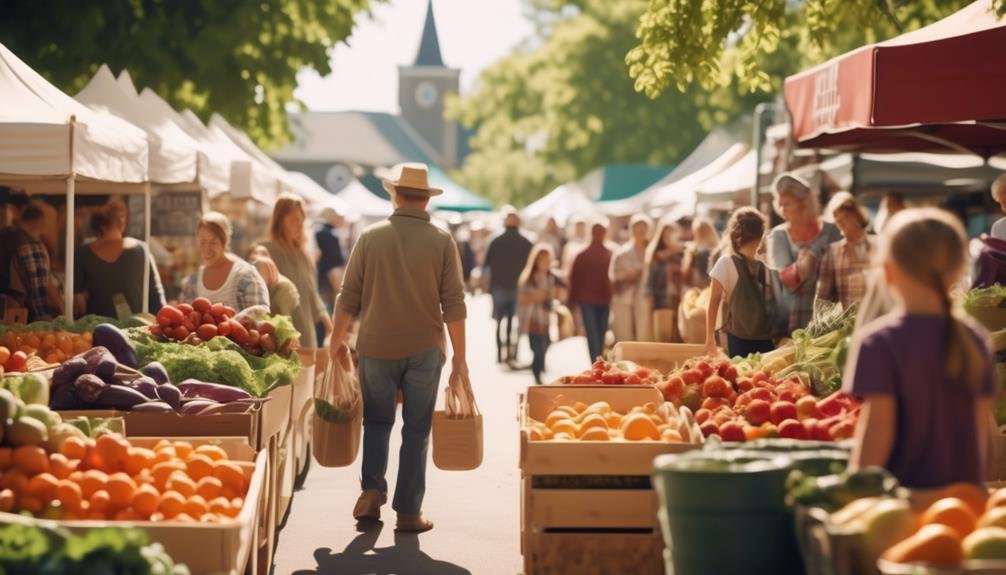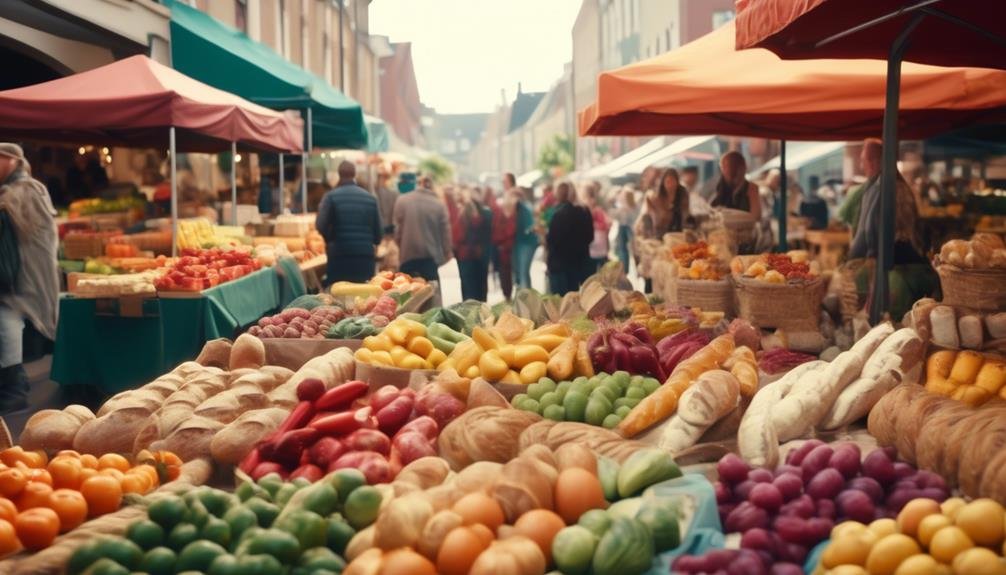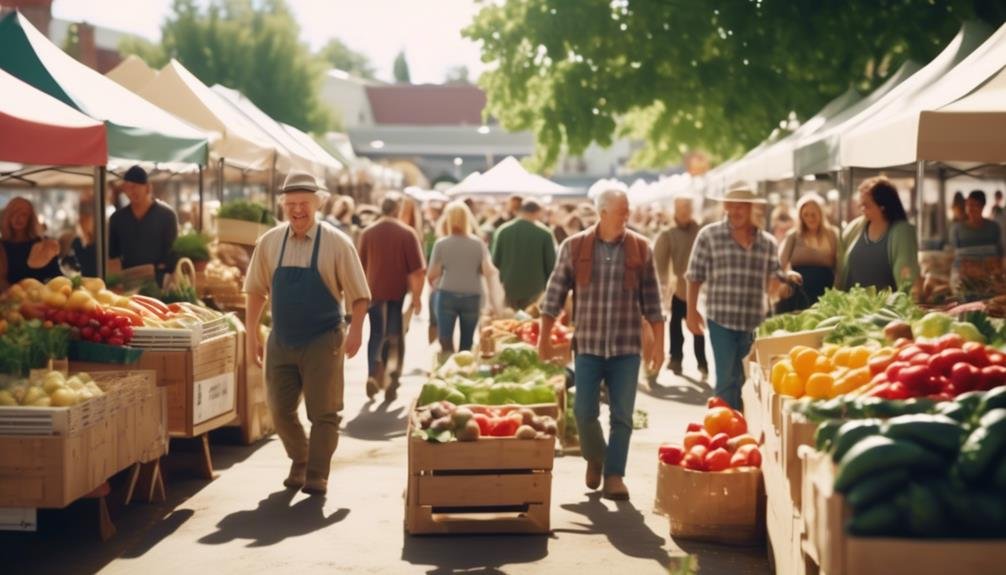"Cherishing Little Steps - A Haven for Baby and Family Journeys"
Local Food for Families
Imagine your family sitting down to a meal that is as comforting and familiar as your favorite pair of slippers, yet as exciting and invigorating as a roller coaster ride. Local food has the power to transform your family's dining experience, bringing together the best of both worlds – the comfort of familiar flavors and the thrill of exploring new tastes.
But it's not just about the food on your plate; it's about the ripple effect that supporting local farmers has on your community and the planet. So, how can local food benefit your family? Let's take a closer look.
Key Takeaways
- Local food offers superior taste due to freshness.
- Choosing locally sourced, organic produce helps reduce carbon footprint.
- Locally sourced ingredients are fresher and retain more nutrients, providing fresher and more nutritious meals.
- Exploring local food markets engages all senses and connects to the heart of the community.
The Benefits of Local Food

When it comes to feeding your family, there are numerous benefits to choosing local food. By opting for locally sourced produce, meats, and dairy products, you not only support your local community but also provide your loved ones with fresh, nutritious, and delicious meals.
One of the advantages of consuming local food is its superior taste. Imagine sinking your teeth into a ripe, juicy tomato that was picked just hours ago from a nearby farm. The burst of flavor is unparalleled, and you can rest easy knowing that it hasn't traveled thousands of miles to reach your plate.
Furthermore, local food is often more nutritious than its counterparts. Since it's harvested at its peak ripeness, it retains higher levels of vitamins, minerals, and antioxidants. By incorporating these nutrient-rich options into your family's diet, you can enhance their overall health and well-being.
Another benefit is the positive impact on the environment. Choosing local food reduces the carbon footprint associated with long-distance transportation and supports sustainable farming practices. You can feel good about knowing that your food choices are contributing to a healthier planet for future generations.
In addition to these advantages, buying local also fosters a sense of community. When you purchase from local farmers and producers, you establish personal connections and build relationships. You can learn about their farming methods, ask questions, and gain a deeper understanding of where your food comes from. It creates a sense of intimacy and trust, knowing that you're supporting hardworking individuals who are passionate about providing quality food for your family.
Supporting Local Farmers
By supporting local farmers, you can continue to enjoy the benefits of local food while directly contributing to the growth and sustainability of your community. When you choose to buy from local farmers, you aren't only supporting their livelihood but also promoting sustainability in your region.
Supporting local farmers means investing in the future of your community. By purchasing their goods, you're helping them generate income, which allows them to continue farming and providing fresh, nutritious food for you and your family. This support also encourages the growth of local agriculture, creating a more resilient and self-sufficient community.
In addition to economic benefits, supporting local farmers also has environmental advantages. Buying locally reduces the carbon footprint associated with transportation since the food doesn't have to travel long distances. It also helps preserve farmland and open spaces, as local farmers are more likely to continue farming when they've a reliable market for their products.
Furthermore, when you support local farmers, you have the opportunity to establish a personal connection with the people who grow your food. You can visit farmer's markets or participate in community-supported agriculture programs, allowing you to meet and interact with the individuals who work hard to bring fresh produce to your table.
Reducing Your Carbon Footprint

Reducing your carbon footprint starts with making mindful choices about the food you consume and how it's sourced. Minimizing environmental impact through eco-friendly eating habits isn't only beneficial for the planet, but also for your own well-being. By opting for locally sourced, organic produce, you aren't only supporting local farmers, but also reducing the carbon emissions associated with transporting food long distances.
When you choose local food, you're reducing the need for long-haul transportation, which contributes to greenhouse gas emissions. Additionally, locally produced food often requires less packaging, further reducing waste and environmental impact. By supporting local farmers who practice sustainable farming methods, you're helping to preserve the health of the soil and reduce the use of harmful chemicals.
Another way to reduce your carbon footprint is by incorporating more plant-based meals into your diet. The production of animal products, such as meat and dairy, is responsible for a significant amount of greenhouse gas emissions. By opting for plant-based alternatives, you can significantly reduce your environmental impact.
Incorporating eco-friendly eating habits into your daily life not only benefits the environment, but it can also inspire others to do the same. By making conscious choices about the food you consume, you're taking a small but significant step towards creating a more sustainable future for generations to come.
Fresher and More Nutritious Meals
Experience the delightful difference of fresher and more nutritious meals with locally sourced ingredients. When it comes to your family's health, there's no compromise. By choosing farm-to-table options, you can ensure that the food you serve isn't only delicious but also packed with essential nutrients.
One of the key health benefits of eating locally sourced ingredients is that they're fresher. Unlike produce that's shipped from distant locations, local ingredients are harvested at their peak ripeness. This means that they retain more of their natural vitamins, minerals, and antioxidants, providing your family with a higher level of nutrition.
In addition to being fresher, locally sourced ingredients also offer a wider range of health benefits. By supporting local farmers, you're encouraging sustainable farming practices that prioritize soil health and biodiversity. This means that the food you consume is free from harmful pesticides and genetically modified organisms, giving you peace of mind about what you're putting on your family's plates.
Not only are locally sourced ingredients healthier, but they also taste better. The vibrant flavors and textures of freshly harvested produce can elevate any meal, making dining a truly enjoyable experience. From crisp, juicy apples to tender, leafy greens, each bite is an explosion of taste and satisfaction.
Make a conscious choice to prioritize your family's health by opting for fresher and more nutritious meals with locally sourced ingredients. By embracing the farm-to-table movement, you'll not only be nourishing your loved ones but also supporting local farmers and fostering a stronger, more sustainable food system.
Exploring Local Food Markets

Discover the vibrant world of local food markets and immerse yourself in a sensory feast of fresh produce, artisanal goods, and community connections.
Exploring local food markets isn't just about shopping for groceries; it's an experience that engages all your senses and connects you to the heart of your community.
When you step into a local food market, you'll be greeted by a kaleidoscope of colors and aromas. Rows of vibrant fruits and vegetables, each more unique than the next, beckon you to discover new flavors and expand your culinary horizons. From heirloom tomatoes to exotic mushrooms, you'll find a treasure trove of unique produce that you won't typically find in your average supermarket.
But local food markets offer more than just fresh produce. They're also a hub for local artisans who showcase their handmade goods. From freshly baked bread to artisanal cheeses, each item tells a story and reflects the passion and craftsmanship of the maker. Take the time to chat with these artisans, learn about their traditional techniques, and discover the stories behind their products.
Exploring local food markets isn't just about shopping; it's about building connections with the people who grow and make our food. It's about supporting local farmers and artisans, and fostering a sense of community.
Connecting With Your Community
Immerse yourself in the heart of your community by connecting with local farmers and artisans at your neighborhood food market. By engaging with the people who grow and create the food you consume, you not only support local businesses but also foster a sense of belonging and connection with your neighbors.
Here are some ways to deepen your ties to the community through these interactions:
- Strike up conversations: Take the time to chat with the farmers and artisans at the market. Ask about their products, their farming practices, and their stories. Building relationships with these individuals won't only enhance your shopping experience but also provide opportunities for future connections and collaborations.
- Attend community events: Many local food markets organize community events such as cooking demonstrations, workshops, and festivals. Participating in these activities allows you to engage with your neighbors, learn new skills, and discover the diverse culinary traditions within your community.
- Join a community-supported agriculture (CSA) program: CSA programs offer a unique opportunity to connect with local farmers on a deeper level. By becoming a member, you can receive regular deliveries of fresh produce directly from the farm, strengthening your bond with the farmers and supporting sustainable agriculture practices.
- Volunteer at the market: Get involved in your local food market by offering your time and skills. Whether it's helping with set-up, assisting customers, or organizing events, volunteering allows you to actively contribute to the vibrancy of your community while forming meaningful connections with like-minded individuals.
Cooking With Seasonal Ingredients

By connecting with local farmers and artisans at your neighborhood food market and learning about their products and practices, you can take your community engagement to the next level and discover the joys of cooking with seasonal ingredients.
Exploring recipes that incorporate these fresh, local ingredients not only enhances the flavors of your dishes but also supports sustainable farming practices and promotes a healthier lifestyle for you and your family.
When you cook with seasonal ingredients, you're using produce that's at its peak in terms of flavor and nutritional value. The vibrant colors and robust flavors of these ingredients can transform an ordinary meal into a culinary masterpiece. From juicy tomatoes in the summer to hearty root vegetables in the winter, each season offers a unique variety of ingredients that can inspire creativity in the kitchen.
Preserving seasonal produce is another way to make the most of these ingredients. You can freeze berries and fruits for smoothies or jams, pickle vegetables to add a tangy crunch to your meals, or even make homemade sauces and salsas to enjoy throughout the year. By preserving these ingredients, you can enjoy the flavors of the season even when they're no longer readily available.
Teaching Your Children About Food
Engaging your children in the world of food can be a fun and educational experience that sets the foundation for a lifetime of healthy eating habits. By teaching them about food, you're providing them with valuable knowledge and skills that will benefit them throughout their lives.
Here are some tips to help you in your journey of food education with your children:
- Explore the farmer's market: Take your children to the local farmer's market and let them see the vibrant array of fruits, vegetables, and other fresh produce. Encourage them to ask questions and interact with the farmers. This hands-on experience will help them understand where their food comes from and appreciate the importance of supporting local farmers.
- Grow your own food: Get your children involved in the process of growing their own food. Whether you have a small garden or just a few pots on a balcony, let them plant seeds, water the plants, and watch as their efforts bear fruit. This won't only teach them about the growth cycle of plants but also instill a sense of pride and accomplishment.
- Cook together: Involve your children in meal preparation. Let them help with simple tasks like washing vegetables, stirring ingredients, or setting the table. Cooking together not only teaches them about different foods and flavors but also fosters creativity and teamwork.
- Try new foods: Encourage your children to be adventurous eaters. Introduce them to a variety of flavors and cuisines. Take them to restaurants that serve different types of food, or try new recipes at home. This will expand their palate and make them more open to trying new and healthy foods.
Creating Memories in the Kitchen

Get ready to create lasting memories in the kitchen with your children as you embark on a culinary adventure together. Bonding over meals and family traditions can bring you closer than ever before. The kitchen becomes a sacred space where laughter, love, and delicious aromas fill the air.
As you gather your ingredients and don your aprons, the anticipation builds. The kitchen becomes a playground, and you're the maestro, guiding your little ones through the steps of a recipe. Each task becomes a learning opportunity, as you teach them about measurements, flavors, and techniques. The joy on their faces as they mix, stir, and taste is priceless.
Creating memories in the kitchen goes beyond just cooking. It's about creating a safe space for your children to explore their creativity and express themselves. It's a time for storytelling, as you share family recipes and the stories behind them. It's about passing down traditions from generation to generation, ensuring that the flavors and memories live on.
These memories will be etched in their hearts forever. Every time they step foot in the kitchen, they'll be reminded of the love and connection that was fostered during those culinary adventures. So, gather your family, fire up the stove, and let the magic unfold. Your kitchen is waiting to be filled with laughter, love, and memories that will be cherished for a lifetime.
Trying New Flavors and Ingredients
Explore a world of new flavors and ingredients with your family as you embark on a culinary adventure in the kitchen. Trying new flavors and ingredients can be an exciting and delicious way to expand your palate and create memorable meals together. Get ready to awaken your taste buds and discover the joys of adventurous cooking.
Here are some ways to incorporate new flavor combinations into your family's meals:
- Experiment with spices and seasonings: Add a pinch of cumin to your roasted vegetables or sprinkle some paprika on your grilled chicken. The possibilities are endless!
- Try different types of cuisines: Dive into the vibrant flavors of Thai, Indian, or Mexican cuisine. Explore new ingredients like lemongrass, turmeric, or chipotle peppers.
- Incorporate local ingredients: Visit your local farmer's market and discover fresh produce that you've never tried before. Experiment with heirloom tomatoes, purple carrots, or exotic fruits.
- Don't forget about herbs: Fresh herbs like basil, cilantro, or mint can elevate any dish. Add them to salads, soups, or marinades for a burst of freshness.
Sustainable and Ethical Food Choices

Make sustainable and ethical food choices a priority for your family's meals by considering the impact of your food on the environment and the welfare of animals. Sustainable farming practices focus on minimizing the use of harmful chemicals and reducing waste, while fair trade ensures that farmers receive fair wages and work in safe conditions. By supporting sustainable farming, you're helping to protect our planet's resources for future generations.
Look for organic produce, which is grown without synthetic pesticides and fertilizers, and choose locally sourced ingredients whenever possible to reduce your carbon footprint.
When it comes to animal products, opt for pasture-raised and grass-fed meats and dairy. These animals are raised in more natural environments and have access to open spaces, which isn't only better for their well-being but also results in more nutritious products for your family. Additionally, consider reducing your consumption of animal products and incorporating more plant-based meals into your family's diet. This can have a positive impact on both the environment and your health.
Supporting fair trade ensures that workers are treated fairly and paid a living wage. Look for products with fair trade certifications, such as coffee, tea, chocolate, and bananas. By choosing fair trade, you're supporting farmers and workers in developing countries, helping to create a more equitable global food system.
Frequently Asked Questions
How Can I Find Local Food Suppliers in My Area?
Looking for local food suppliers in your area? Finding them has never been easier! By buying local food, you not only support your community but also enjoy the freshest, most delicious produce around.
Are There Any Financial Benefits to Buying Local Food?
There are definitely financial benefits to buying local food. Not only do you support local farmers and businesses, but you also cut down on transportation costs, which can save you money in the long run. Plus, you'll reduce your environmental impact!
Can I Still Eat Local Food During the Winter Months?
You can definitely still eat local food during the winter months! By engaging in winter gardening and preserving local produce, you can enjoy fresh and nutritious meals all year round.
Are There Any Health Risks Associated With Eating Local Food?
There aren't many health risks associated with eating local food. In fact, there are numerous health benefits, like fresher produce and less exposure to pesticides. Plus, you're reducing the environmental impact of shipping food long distances.
How Can I Support Local Farmers if I Don't Have Access to Local Food Markets?
If you can't access local food markets, you can still support local farmers by joining a community-supported agriculture (CSA) program. Through a CSA, you can receive regular deliveries of fresh, locally grown produce directly from the farmer.
Conclusion
In conclusion, choosing to support local food not only benefits your family but also the environment and local farmers. By opting for local produce, you can reduce your carbon footprint and enjoy fresher, more nutritious meals.
Exploring local food markets allows you to teach your children about food and create lasting memories in the kitchen. Additionally, trying new flavors and ingredients opens up a world of culinary possibilities.
Ultimately, making sustainable and ethical food choices is a win-win situation for everyone involved.


